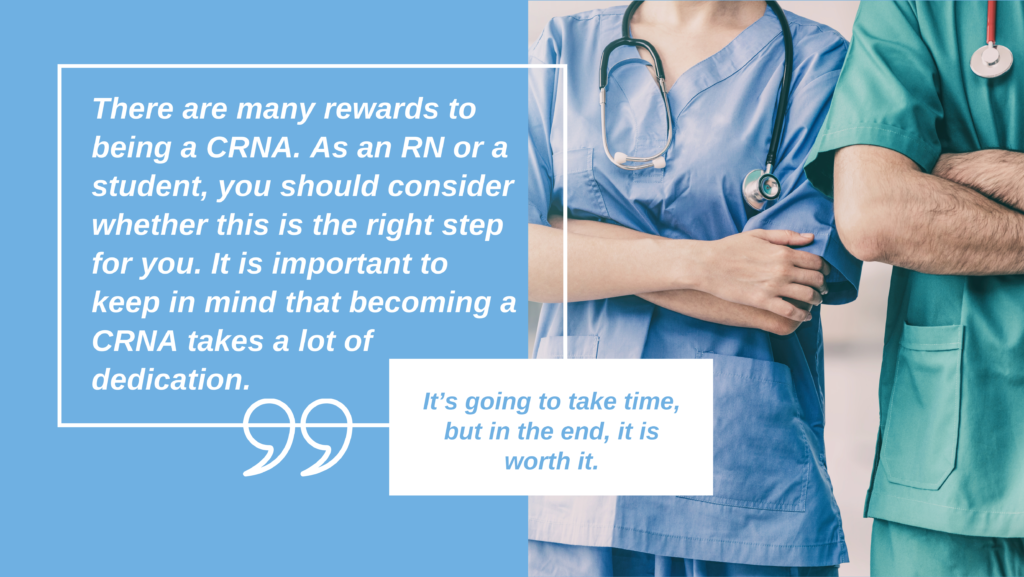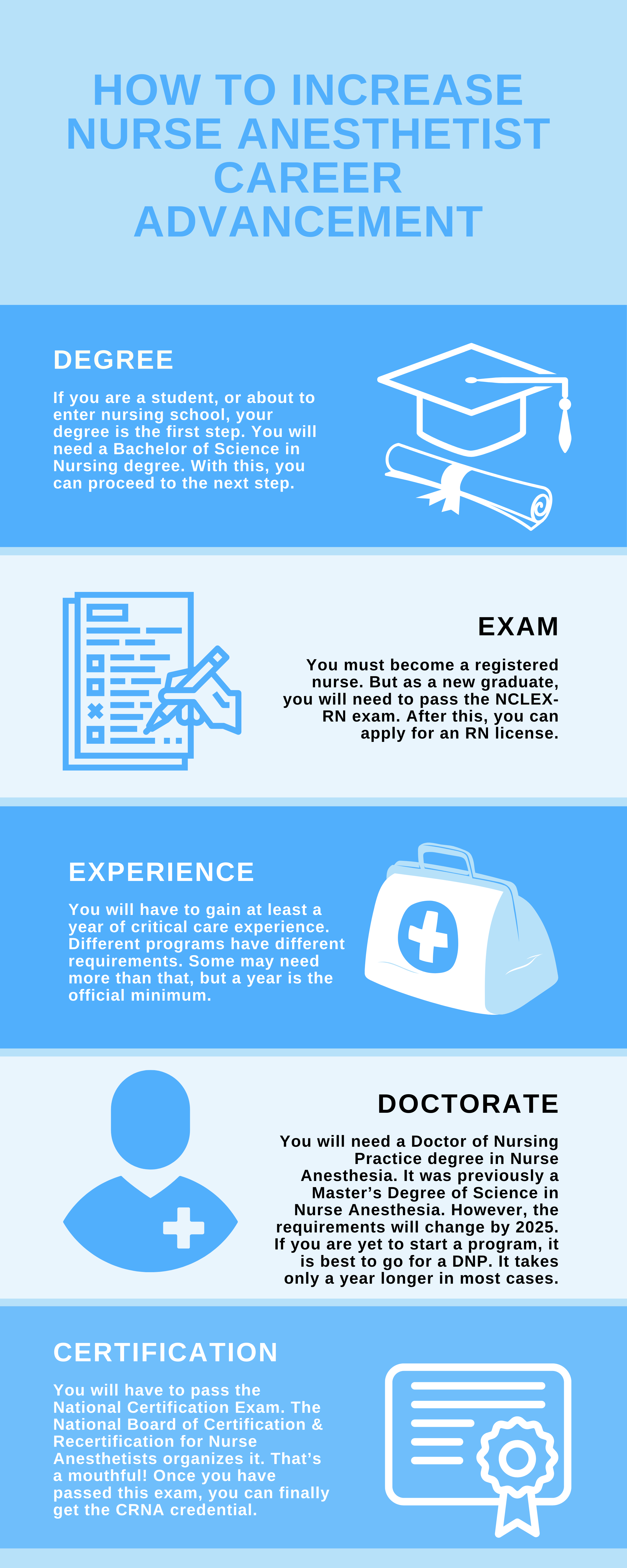If you’re a nurse or nursing student who is trying to decide which career path to take, you have many options. Sometimes it can be hard to decide which way to go. One option to consider is becoming a CRNA or certified registered nurse anesthetist.
To advance in a nurse anesthetist career, you must first become a registered nurse. And this is just the first of many steps that you need to take.

A CRNA is a great choice to make. A CRNA is an advanced practice nurse who specializes in anesthesia. They administer anesthesia to patients having surgery and are vital to surgical teams.
If you want to become a nurse anesthetist, there are many things that you’ll need to know. What exactly are their responsibilities? What are the benefits of becoming a CRNA? This post is here to answer those questions.
What Does a CRNA Do?
A nurse anesthetist is responsible for a patient from the pre-op area all the way through the recovery room. A CRNA, though, has many specialist tasks which only they can perform. Essentially, they give anesthesia and monitor patients through its duration of action. The CRNA is there to make sure the patient goes under safely and comes out fine.
The CRNA is in charge of anesthesia on their own. In some workplaces, he or she may be part of a team with an anesthesiologist.

Here are some of a CRNA’s responsibilities:
- The nurse anesthetist assesses the patient’s physical state before the surgery. He or she will make sure that the patient’s condition is safe for anesthesia.
- A CRNA will talk with the patient before the surgery. This is to ensure that the patient understands the process and what will happen. It also helps to reassure patients and take care of any fears they may have. CRNAs will also discuss the recovery process in detail.
- After the CRNA has informed the patient of the process, he or she can then obtain consent. Consent is the official means of getting permission to allow the team to go ahead with the procedure.

- The nurse anesthetist is also qualified to prepare anesthetic solutions. He or she will make sure that the dosage of the anesthetic is precise for the specific patient. Anesthetics can cause serious side effects if administered incorrectly. This is why CRNAs have to earn the qualifications to enable them to handle such substances.
- The CRNA also administers the anesthetic drugs in the precise amount required.
- Once the patient is under, the CRNA’s job is to maintain that state. The effects of anesthesia should not wear off until the procedure is over.
- The nurse anesthetist also ensures the patient remains stable through the surgery. He or she will remain with them and monitor vital signs.
- After the surgery is complete, the nurse anesthetist comes in again. He or she must ensure that the patient comes out of anesthesia. The nurse anesthetist will also monitor the patient’s post-op recovery before transfer.

What Are the Benefits of Choosing a Nurse Anesthetist Career?
There are many advantages to becoming a CRNA. They include the following:
- The pay is excellent. Nurse anesthetists are the highest-paid nurse specialization. Naturally, this attracts many to the field. However, even for those who have a genuine desire to become a CRNA, the pay is a very good incentive.
- Many people accord them much respect. Being a CRNA comes with a lot of respect from healthcare workers. They are an important part of medical teams and this is often recognized. The time and dedication it takes to become a CRNA is also something many people recognize. This explains their frequent involvement in many administrative processes. The judgment of a CRNA is held in high esteem!
- The freedom to make clinical decisions. In the medical field, many people wish to make their own decisions. After years of working, it may sometimes be monotonous acting on other people’s decisions. A nurse anesthetist gets the independence to make decisions on their own. They can make plans and choices that ensure the patient remains in the best of health. This autonomy is a major advantage to many people.
How to Advance Towards a Nurse Anesthetist Career
Before you make that decision to work towards being a CRNA, see if you can shadow a nurse anesthetist on the job. This will give you the best exposure to a CRNA’s daily work life. It will help you see all the benefits firsthand, and will increase your interest!
If you have already been able to shadow, you’ll know if becoming a CRNA is something you have an interest in or not. If it is, then great! It is important to know that it takes a lot of steps to finally get to the last stage, which is CRNA. If you have the dedication, you can do it!

Here is a brief overview of the steps you need to take to become a nurse anesthetist!
- If you are a student, or about to enter nursing school, your degree is the first step. You will need a Bachelor of Science in Nursing degree. With this, you can proceed to the next step.
- You must become a registered nurse. But as a new graduate, you will need to pass the NCLEX-RN exam. After this, you can apply for an RN license.
- You will have to gain at least a year of critical care experience. Different programs have different requirements. Some may need more than that, but a year is the official minimum.
- Now, you will need a Doctor of Nursing Practice degree in Nurse Anesthesia. It was previously a Master’s Degree of Science in Nurse Anesthesia. However, the requirements will change by 2025. If you are yet to start a program, it is best to go for a DNP. It takes only a year longer in most cases.
- Now comes the final step. You will have to pass the National Certification Exam. The National Board of Certification & Recertification for Nurse Anesthetists organizes it. That’s a mouthful! Once you have passed this exam, you can finally get the CRNA credential.
This is a summary of the steps you will need to take. Some of these steps will have more complexity to them, but this is the basic state of things.
There are many rewards to being a CRNA. As an RN or a student, you should consider whether this is the right step for you.
It is important to keep in mind that becoming a CRNA takes a lot of dedication. It’s going to take time, but in the end, it is worth it.

